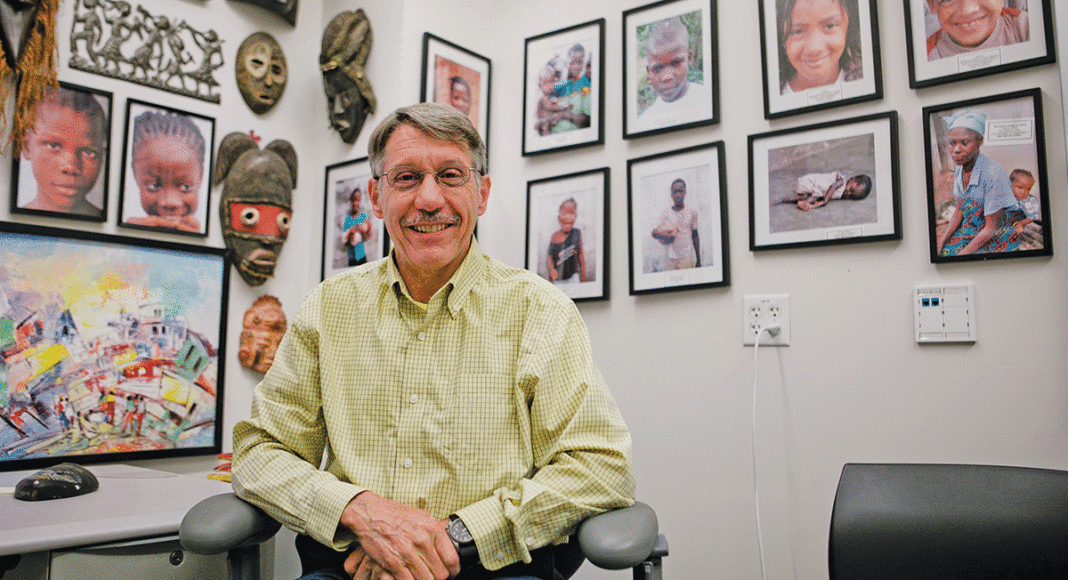Through the swirling dust of a refugee camp in Eastern Lebanon, two girls wearing school uniforms catch Tony Hoffman’s eye. The child psychologist and UCSC lecturer approaches the high-school-age girls and begins asking about how they first arrived at the camp and what their lives were like before.
Having spent more than a year in the camp, both girls know the safest routes to school. They’ve become friends since fleeing Syria with their families. The older girl, who sports tennis shoes and Western-style bangles, was studying computer science before the Syrian Civil War broke out. The other girl—who’s wearing artfully done makeup, pretty universal in Syria and in the camps—was studying literature. Today, they are students in a school run by a non-governmental organization and funded by Malala Yousafzai, the youngest person ever to win the Nobel Peace Prize. This area, Bekaa Valley, contains the region’s highest density of vulnerable Syrian refugees, Hoffman says, and it’s six miles from the Syrian border.
The girls are from different parts of Syria, Aleppo and Damascus, but their stories are eerily—and heartbreakingly—similar. They are among the half of all Syrians who’ve been driven from their homes by bombs, siege, starvation, chemical attacks, and domicide, which is the widespread destruction of people’s homes, and are fueling the largest refugee crisis since World War II. Both girls just want to go home, but have no homes to return to.
“We have nowhere to go, and we cannot stay here. We cannot even call the dirt under our feet our own,” they tell Hoffman. An estimated 100 Syrians flee the country every hour, Hoffman says, and entire communities will have nothing but rubble to return to once the war is over.
Hoffman says war should, first and foremost, be seen as an attack on children.
“Children are more vulnerable to injury,” says Hoffman, who’s retiring from UCSC, having taught his final class at the university this past spring. “They are more vulnerable to disease and starvation. In war, children always lose.”
The conflict—which began seven years ago as the Arab Spring was well underway—has Syria in tatters. While watching the situation worsen on his trips to Lebanon, where one out of every four people is a Syrian refugee, Hoffman has felt powerless to stop it.
As a developmental psychologist, Hoffman is fascinated with how children survive extreme circumstances. Over the past five years, he has been leading a double life, splitting his time between professorial duties at UCSC and the American University in Beirut, where he is running AUB’s psychosocial services for refugee children. He teaches a course on war-affected children at each university.
EMERGENCY EXIT
A half a world away, Hoffman’s spacious office on the third floor of the UCSC Social Sciences 2 building feels cramped. Ornately carved wooden masks and dozens of framed pictures of himself with child refugees from brutal conflicts around the world cover every inch of the cream-colored walls.
According to a 2017 poll conducted by CNN/ORC, more than half of Americans favored allowing refugees from Syria to seek asylum in the United States, but only 25 percent were strongly in favor. Hoffman hopes to help shape the way his fellow Americans understand the situation.
“I’m reviving the concept of deep homelessness in my writing and lectures,” he says, “so people can understand the psychology of these refugees.”
Refugees are scattering in four directions—south to Jordan, east to Iraq, west to Lebanon, north into Turkey, and, of course, toward Europe, which is the route that’s gotten the most attention. But Hoffman explains that the refugee flow into Europe has largely stopped by now.
“Host countries don’t have the means to repatriate them and feed them and they want them to go home,” he says. “But these refugees have no home to go to.”
ORDER PATROL
Last year, an executive order signed by Donald Trump effectively closed the United States’ borders to any and all Syrian refugees. European governments and their citizens are fighting against the influx of refugees as well, with physical walls, laws and regulations. In many European countries, violence against migrants is common.
Hoffman says Syrian refugees are often seen as “freeloaders taking away local jobs, outsiders, cowards, and criminals. The negative stereotypes we hear in the United States about migrants are just as prevalent in other parts of the world.”
Westerners have focused on the refugee crisis in Europe, rather than on the 80 percent of refugees remaining in Turkey, Lebanon and Jordan, Hoffman says. “Our Islamophobia plays a role in not addressing the issue where it’s at its worst,” Hoffman explains.
In September of 2015, the Kurdi family of Syria paid smugglers $5,860 for four spaces on a small inflatable boat in the hopes of reaching “safety” in Europe. The five-meter-long boat carrying the Kurdis and eight others capsized just five minutes after pushing off Bodrum in Turkey. Their boat carried no life jackets and the entire Syrian family drowned, except for the father.
When the salt-caked body of 3-year-old Alan Kurdi—still wearing shoes and a red rocket ship T-shirt—washed ashore from the Mediterranean Sea, it made international headlines. In Syria, it was a cautionary tale.
“There’s a saying in Syria now,” Hoffman tells me. “‘The land isn’t safe and the sea isn’t safe. We have nowhere to go.’”
Over the past few years, much of the attention Syria has gotten has been directed at dictator Bashar al-Assad and his use of chemical weapons. Hoffman, who’s seen the effects firsthand, however, reports that the weapons are being used by most major groups in the region, not just Assad.
Outside of Syria, Hoffman says the situation in Lebanon is as complicated as it is anywhere, given the dramatic change in demographics.
“People are cordial and kind and are respectful,” he says, “because there is so much tension. They don’t want to step on anyone’s toes.”














He is a hero! I had the honor of working with him in Lebanon. Prof Tony is inspiring and a wonderful human being.